Case Studies of Business Law and Corporations Law - HI6027 Assignment
VerifiedAdded on 2022/10/04
|9
|2458
|28
Homework Assignment
AI Summary
This document presents a comprehensive solution to a business and corporate law assignment, focusing on two case studies. Part A analyzes contract law principles, specifically addressing offer, acceptance, and the formation of legally binding agreements, referencing cases like Appleson v Littlewoods and Adams v Lindsell. The scenario involves a writer negotiating book publication rights, exploring issues of social agreements versus contracts, and counter-offers. Part B delves into corporate law, examining the duties of company directors under the Corporations Act 2001 (Cth). It discusses director's responsibilities regarding care, diligence, and the business judgment rule (s 180), as well as the implications of insolvent trading (s 588G). The analysis considers scenarios where directors may breach their duties, potentially leading to liability, and references relevant cases like ASIC v Healey and The Bell Group Ltd (in liq) v Westpac Banking Corporation & Ors [No 9]. The assignment assesses the ethical implications of legal decisions and their impact on the business environment, analyzing obligations, rights, and remedies in commercial relationships, and applying the legal framework regulating a company's dealings with outsiders, all while referencing relevant legislation and case law.
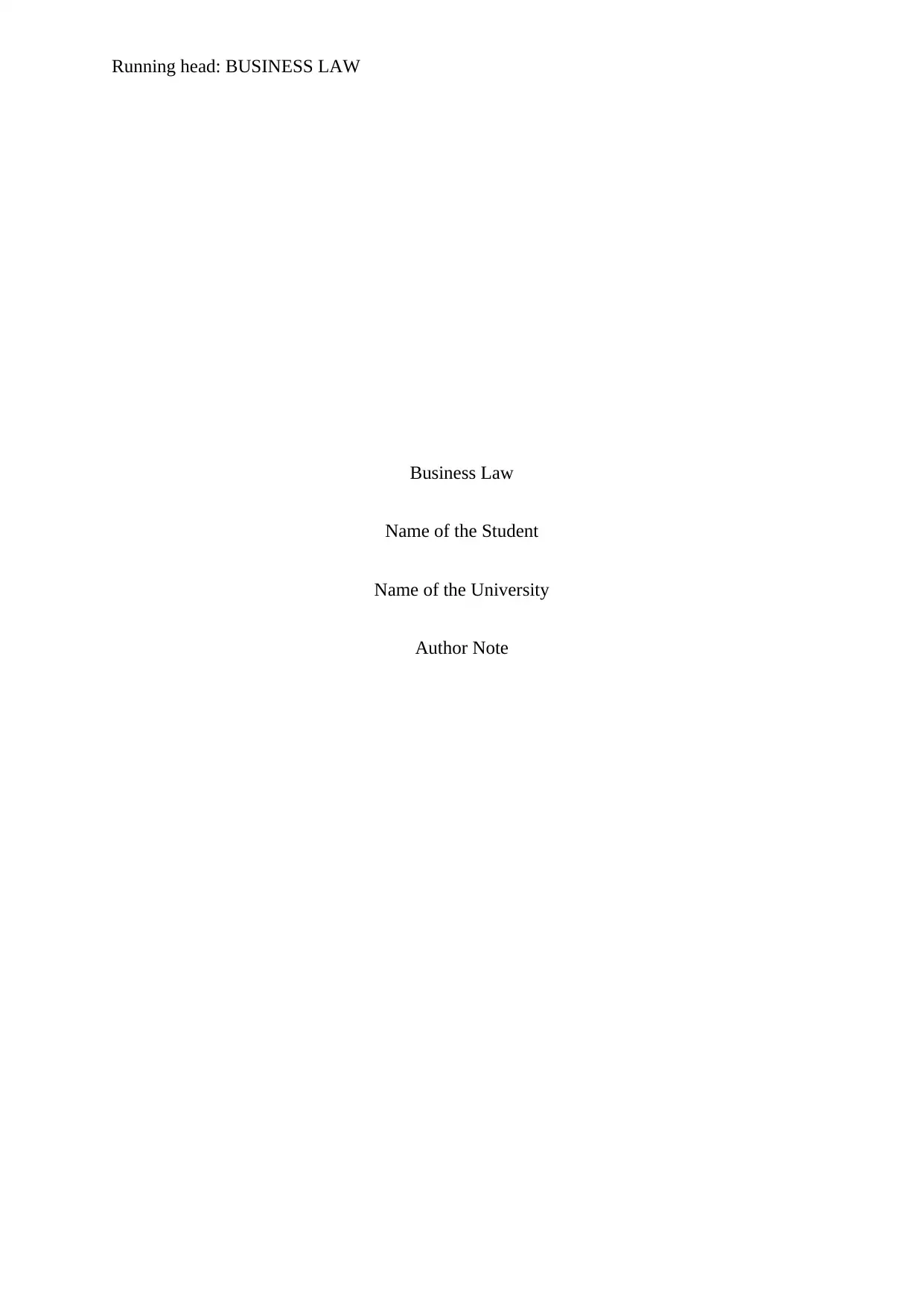
Running head: BUSINESS LAW
Business Law
Name of the Student
Name of the University
Author Note
Business Law
Name of the Student
Name of the University
Author Note
Paraphrase This Document
Need a fresh take? Get an instant paraphrase of this document with our AI Paraphraser
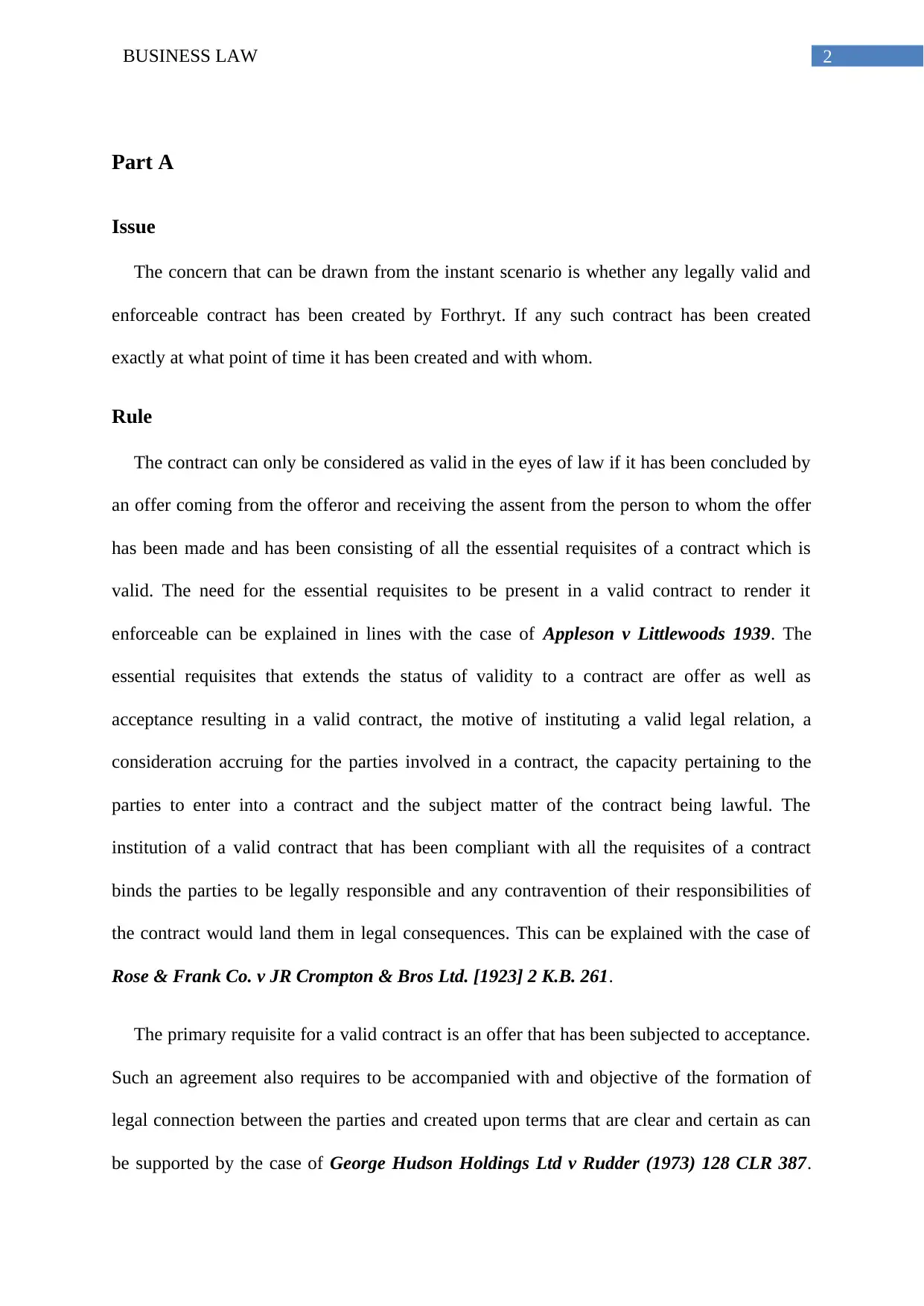
2BUSINESS LAW
Part A
Issue
The concern that can be drawn from the instant scenario is whether any legally valid and
enforceable contract has been created by Forthryt. If any such contract has been created
exactly at what point of time it has been created and with whom.
Rule
The contract can only be considered as valid in the eyes of law if it has been concluded by
an offer coming from the offeror and receiving the assent from the person to whom the offer
has been made and has been consisting of all the essential requisites of a contract which is
valid. The need for the essential requisites to be present in a valid contract to render it
enforceable can be explained in lines with the case of Appleson v Littlewoods 1939. The
essential requisites that extends the status of validity to a contract are offer as well as
acceptance resulting in a valid contract, the motive of instituting a valid legal relation, a
consideration accruing for the parties involved in a contract, the capacity pertaining to the
parties to enter into a contract and the subject matter of the contract being lawful. The
institution of a valid contract that has been compliant with all the requisites of a contract
binds the parties to be legally responsible and any contravention of their responsibilities of
the contract would land them in legal consequences. This can be explained with the case of
Rose & Frank Co. v JR Crompton & Bros Ltd. [1923] 2 K.B. 261.
The primary requisite for a valid contract is an offer that has been subjected to acceptance.
Such an agreement also requires to be accompanied with and objective of the formation of
legal connection between the parties and created upon terms that are clear and certain as can
be supported by the case of George Hudson Holdings Ltd v Rudder (1973) 128 CLR 387.
Part A
Issue
The concern that can be drawn from the instant scenario is whether any legally valid and
enforceable contract has been created by Forthryt. If any such contract has been created
exactly at what point of time it has been created and with whom.
Rule
The contract can only be considered as valid in the eyes of law if it has been concluded by
an offer coming from the offeror and receiving the assent from the person to whom the offer
has been made and has been consisting of all the essential requisites of a contract which is
valid. The need for the essential requisites to be present in a valid contract to render it
enforceable can be explained in lines with the case of Appleson v Littlewoods 1939. The
essential requisites that extends the status of validity to a contract are offer as well as
acceptance resulting in a valid contract, the motive of instituting a valid legal relation, a
consideration accruing for the parties involved in a contract, the capacity pertaining to the
parties to enter into a contract and the subject matter of the contract being lawful. The
institution of a valid contract that has been compliant with all the requisites of a contract
binds the parties to be legally responsible and any contravention of their responsibilities of
the contract would land them in legal consequences. This can be explained with the case of
Rose & Frank Co. v JR Crompton & Bros Ltd. [1923] 2 K.B. 261.
The primary requisite for a valid contract is an offer that has been subjected to acceptance.
Such an agreement also requires to be accompanied with and objective of the formation of
legal connection between the parties and created upon terms that are clear and certain as can
be supported by the case of George Hudson Holdings Ltd v Rudder (1973) 128 CLR 387.
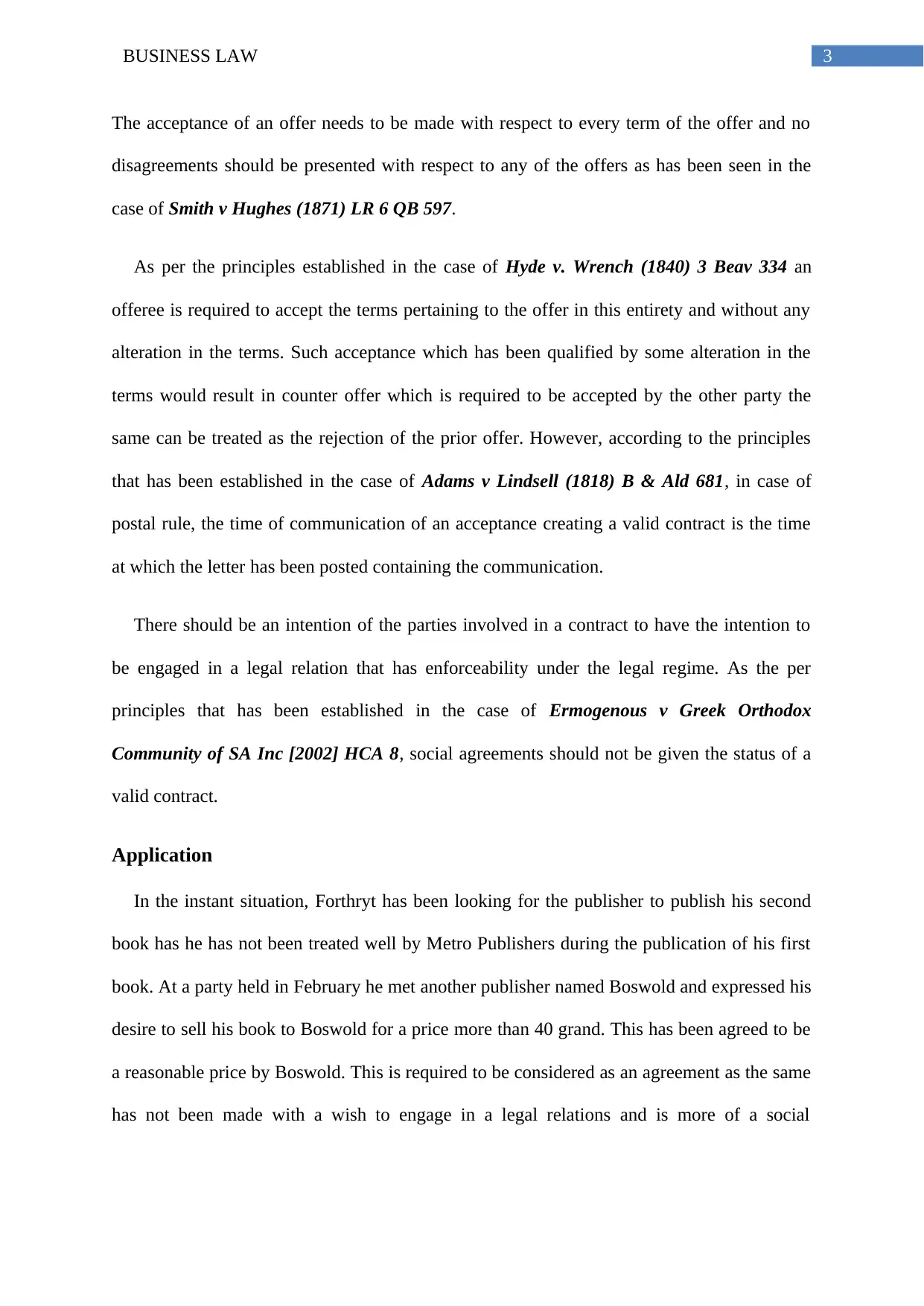
3BUSINESS LAW
The acceptance of an offer needs to be made with respect to every term of the offer and no
disagreements should be presented with respect to any of the offers as has been seen in the
case of Smith v Hughes (1871) LR 6 QB 597.
As per the principles established in the case of Hyde v. Wrench (1840) 3 Beav 334 an
offeree is required to accept the terms pertaining to the offer in this entirety and without any
alteration in the terms. Such acceptance which has been qualified by some alteration in the
terms would result in counter offer which is required to be accepted by the other party the
same can be treated as the rejection of the prior offer. However, according to the principles
that has been established in the case of Adams v Lindsell (1818) B & Ald 681, in case of
postal rule, the time of communication of an acceptance creating a valid contract is the time
at which the letter has been posted containing the communication.
There should be an intention of the parties involved in a contract to have the intention to
be engaged in a legal relation that has enforceability under the legal regime. As the per
principles that has been established in the case of Ermogenous v Greek Orthodox
Community of SA Inc [2002] HCA 8, social agreements should not be given the status of a
valid contract.
Application
In the instant situation, Forthryt has been looking for the publisher to publish his second
book has he has not been treated well by Metro Publishers during the publication of his first
book. At a party held in February he met another publisher named Boswold and expressed his
desire to sell his book to Boswold for a price more than 40 grand. This has been agreed to be
a reasonable price by Boswold. This is required to be considered as an agreement as the same
has not been made with a wish to engage in a legal relations and is more of a social
The acceptance of an offer needs to be made with respect to every term of the offer and no
disagreements should be presented with respect to any of the offers as has been seen in the
case of Smith v Hughes (1871) LR 6 QB 597.
As per the principles established in the case of Hyde v. Wrench (1840) 3 Beav 334 an
offeree is required to accept the terms pertaining to the offer in this entirety and without any
alteration in the terms. Such acceptance which has been qualified by some alteration in the
terms would result in counter offer which is required to be accepted by the other party the
same can be treated as the rejection of the prior offer. However, according to the principles
that has been established in the case of Adams v Lindsell (1818) B & Ald 681, in case of
postal rule, the time of communication of an acceptance creating a valid contract is the time
at which the letter has been posted containing the communication.
There should be an intention of the parties involved in a contract to have the intention to
be engaged in a legal relation that has enforceability under the legal regime. As the per
principles that has been established in the case of Ermogenous v Greek Orthodox
Community of SA Inc [2002] HCA 8, social agreements should not be given the status of a
valid contract.
Application
In the instant situation, Forthryt has been looking for the publisher to publish his second
book has he has not been treated well by Metro Publishers during the publication of his first
book. At a party held in February he met another publisher named Boswold and expressed his
desire to sell his book to Boswold for a price more than 40 grand. This has been agreed to be
a reasonable price by Boswold. This is required to be considered as an agreement as the same
has not been made with a wish to engage in a legal relations and is more of a social
⊘ This is a preview!⊘
Do you want full access?
Subscribe today to unlock all pages.

Trusted by 1+ million students worldwide
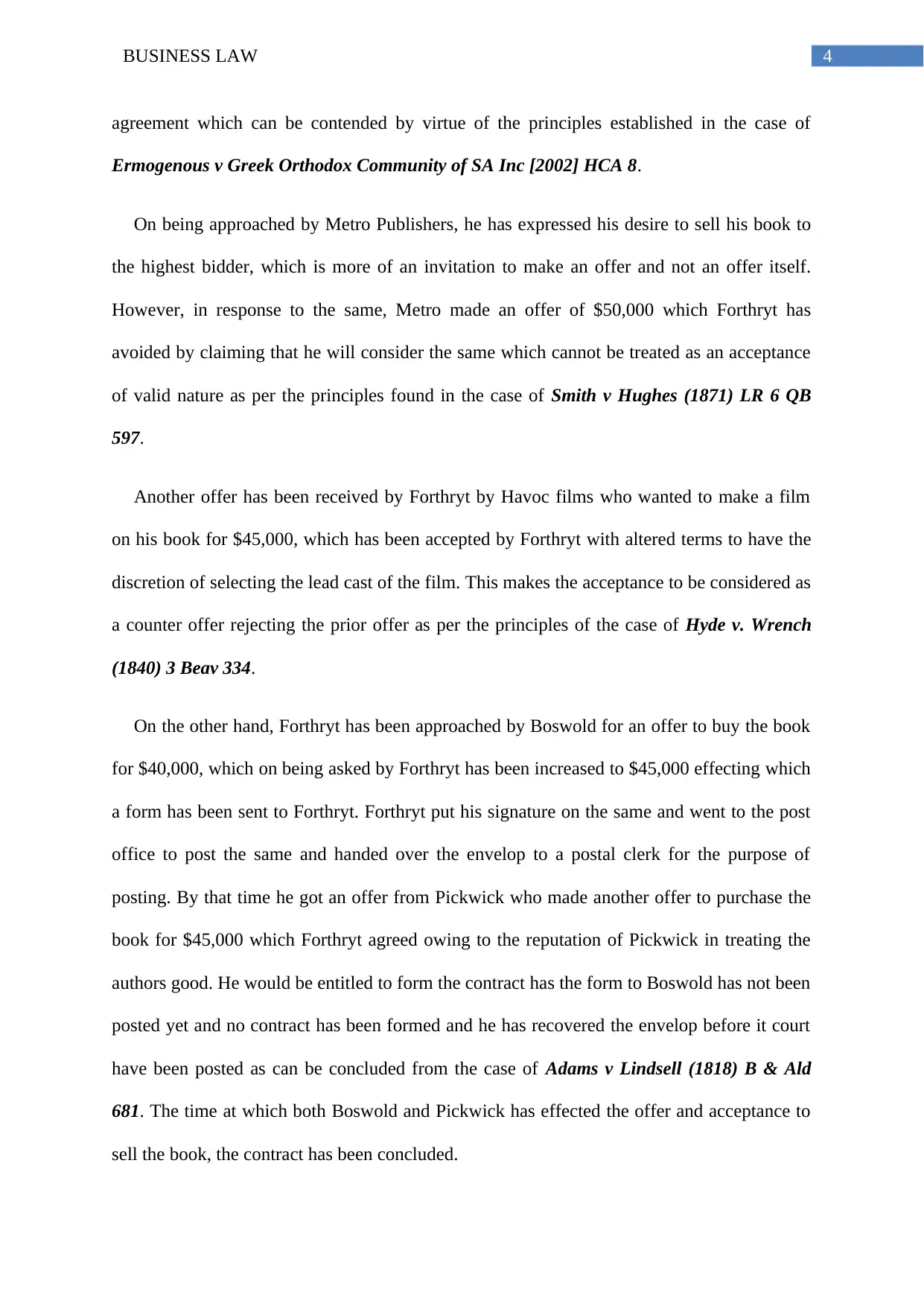
4BUSINESS LAW
agreement which can be contended by virtue of the principles established in the case of
Ermogenous v Greek Orthodox Community of SA Inc [2002] HCA 8.
On being approached by Metro Publishers, he has expressed his desire to sell his book to
the highest bidder, which is more of an invitation to make an offer and not an offer itself.
However, in response to the same, Metro made an offer of $50,000 which Forthryt has
avoided by claiming that he will consider the same which cannot be treated as an acceptance
of valid nature as per the principles found in the case of Smith v Hughes (1871) LR 6 QB
597.
Another offer has been received by Forthryt by Havoc films who wanted to make a film
on his book for $45,000, which has been accepted by Forthryt with altered terms to have the
discretion of selecting the lead cast of the film. This makes the acceptance to be considered as
a counter offer rejecting the prior offer as per the principles of the case of Hyde v. Wrench
(1840) 3 Beav 334.
On the other hand, Forthryt has been approached by Boswold for an offer to buy the book
for $40,000, which on being asked by Forthryt has been increased to $45,000 effecting which
a form has been sent to Forthryt. Forthryt put his signature on the same and went to the post
office to post the same and handed over the envelop to a postal clerk for the purpose of
posting. By that time he got an offer from Pickwick who made another offer to purchase the
book for $45,000 which Forthryt agreed owing to the reputation of Pickwick in treating the
authors good. He would be entitled to form the contract has the form to Boswold has not been
posted yet and no contract has been formed and he has recovered the envelop before it court
have been posted as can be concluded from the case of Adams v Lindsell (1818) B & Ald
681. The time at which both Boswold and Pickwick has effected the offer and acceptance to
sell the book, the contract has been concluded.
agreement which can be contended by virtue of the principles established in the case of
Ermogenous v Greek Orthodox Community of SA Inc [2002] HCA 8.
On being approached by Metro Publishers, he has expressed his desire to sell his book to
the highest bidder, which is more of an invitation to make an offer and not an offer itself.
However, in response to the same, Metro made an offer of $50,000 which Forthryt has
avoided by claiming that he will consider the same which cannot be treated as an acceptance
of valid nature as per the principles found in the case of Smith v Hughes (1871) LR 6 QB
597.
Another offer has been received by Forthryt by Havoc films who wanted to make a film
on his book for $45,000, which has been accepted by Forthryt with altered terms to have the
discretion of selecting the lead cast of the film. This makes the acceptance to be considered as
a counter offer rejecting the prior offer as per the principles of the case of Hyde v. Wrench
(1840) 3 Beav 334.
On the other hand, Forthryt has been approached by Boswold for an offer to buy the book
for $40,000, which on being asked by Forthryt has been increased to $45,000 effecting which
a form has been sent to Forthryt. Forthryt put his signature on the same and went to the post
office to post the same and handed over the envelop to a postal clerk for the purpose of
posting. By that time he got an offer from Pickwick who made another offer to purchase the
book for $45,000 which Forthryt agreed owing to the reputation of Pickwick in treating the
authors good. He would be entitled to form the contract has the form to Boswold has not been
posted yet and no contract has been formed and he has recovered the envelop before it court
have been posted as can be concluded from the case of Adams v Lindsell (1818) B & Ald
681. The time at which both Boswold and Pickwick has effected the offer and acceptance to
sell the book, the contract has been concluded.
Paraphrase This Document
Need a fresh take? Get an instant paraphrase of this document with our AI Paraphraser
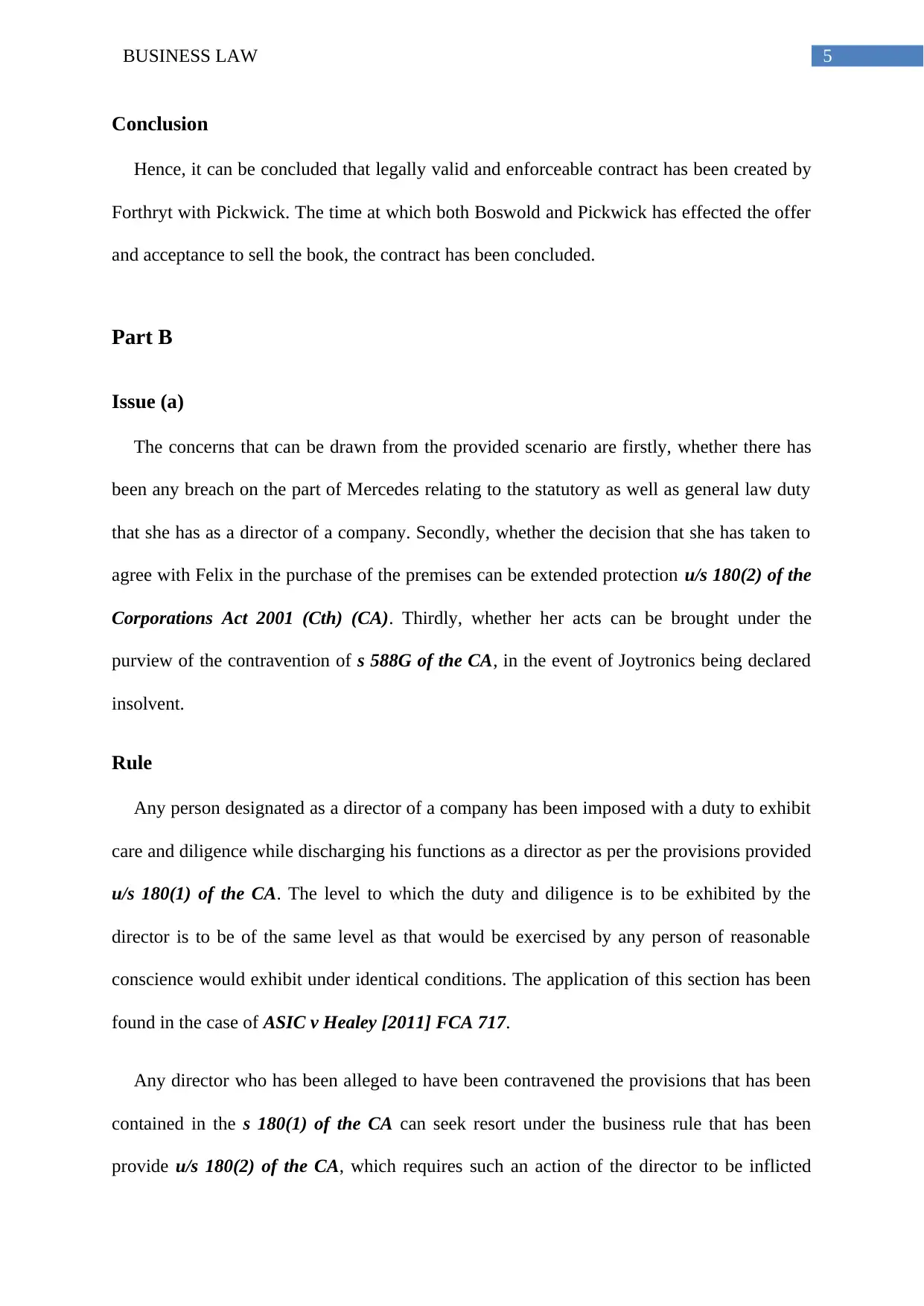
5BUSINESS LAW
Conclusion
Hence, it can be concluded that legally valid and enforceable contract has been created by
Forthryt with Pickwick. The time at which both Boswold and Pickwick has effected the offer
and acceptance to sell the book, the contract has been concluded.
Part B
Issue (a)
The concerns that can be drawn from the provided scenario are firstly, whether there has
been any breach on the part of Mercedes relating to the statutory as well as general law duty
that she has as a director of a company. Secondly, whether the decision that she has taken to
agree with Felix in the purchase of the premises can be extended protection u/s 180(2) of the
Corporations Act 2001 (Cth) (CA). Thirdly, whether her acts can be brought under the
purview of the contravention of s 588G of the CA, in the event of Joytronics being declared
insolvent.
Rule
Any person designated as a director of a company has been imposed with a duty to exhibit
care and diligence while discharging his functions as a director as per the provisions provided
u/s 180(1) of the CA. The level to which the duty and diligence is to be exhibited by the
director is to be of the same level as that would be exercised by any person of reasonable
conscience would exhibit under identical conditions. The application of this section has been
found in the case of ASIC v Healey [2011] FCA 717.
Any director who has been alleged to have been contravened the provisions that has been
contained in the s 180(1) of the CA can seek resort under the business rule that has been
provide u/s 180(2) of the CA, which requires such an action of the director to be inflicted
Conclusion
Hence, it can be concluded that legally valid and enforceable contract has been created by
Forthryt with Pickwick. The time at which both Boswold and Pickwick has effected the offer
and acceptance to sell the book, the contract has been concluded.
Part B
Issue (a)
The concerns that can be drawn from the provided scenario are firstly, whether there has
been any breach on the part of Mercedes relating to the statutory as well as general law duty
that she has as a director of a company. Secondly, whether the decision that she has taken to
agree with Felix in the purchase of the premises can be extended protection u/s 180(2) of the
Corporations Act 2001 (Cth) (CA). Thirdly, whether her acts can be brought under the
purview of the contravention of s 588G of the CA, in the event of Joytronics being declared
insolvent.
Rule
Any person designated as a director of a company has been imposed with a duty to exhibit
care and diligence while discharging his functions as a director as per the provisions provided
u/s 180(1) of the CA. The level to which the duty and diligence is to be exhibited by the
director is to be of the same level as that would be exercised by any person of reasonable
conscience would exhibit under identical conditions. The application of this section has been
found in the case of ASIC v Healey [2011] FCA 717.
Any director who has been alleged to have been contravened the provisions that has been
contained in the s 180(1) of the CA can seek resort under the business rule that has been
provide u/s 180(2) of the CA, which requires such an action of the director to be inflicted
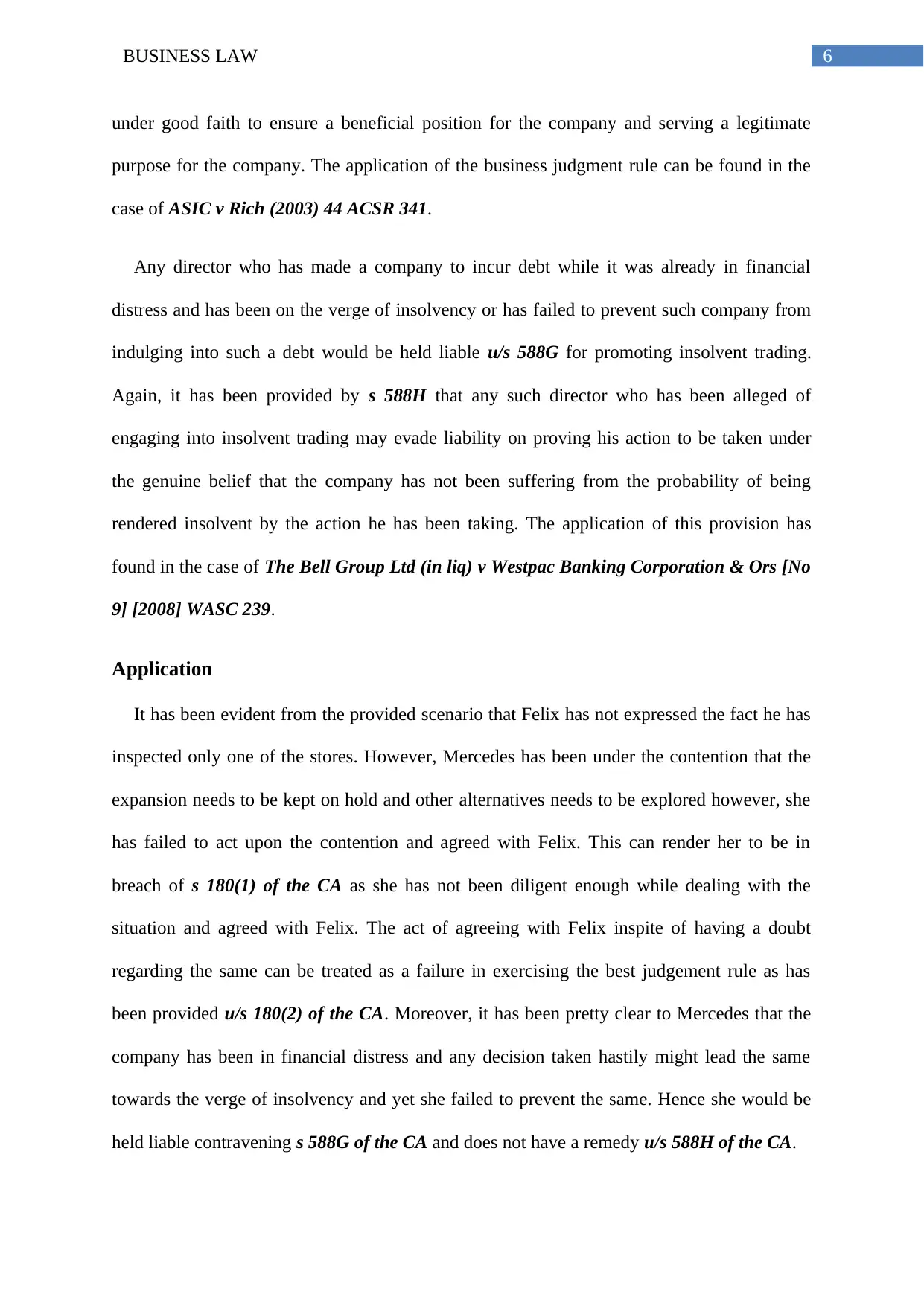
6BUSINESS LAW
under good faith to ensure a beneficial position for the company and serving a legitimate
purpose for the company. The application of the business judgment rule can be found in the
case of ASIC v Rich (2003) 44 ACSR 341.
Any director who has made a company to incur debt while it was already in financial
distress and has been on the verge of insolvency or has failed to prevent such company from
indulging into such a debt would be held liable u/s 588G for promoting insolvent trading.
Again, it has been provided by s 588H that any such director who has been alleged of
engaging into insolvent trading may evade liability on proving his action to be taken under
the genuine belief that the company has not been suffering from the probability of being
rendered insolvent by the action he has been taking. The application of this provision has
found in the case of The Bell Group Ltd (in liq) v Westpac Banking Corporation & Ors [No
9] [2008] WASC 239.
Application
It has been evident from the provided scenario that Felix has not expressed the fact he has
inspected only one of the stores. However, Mercedes has been under the contention that the
expansion needs to be kept on hold and other alternatives needs to be explored however, she
has failed to act upon the contention and agreed with Felix. This can render her to be in
breach of s 180(1) of the CA as she has not been diligent enough while dealing with the
situation and agreed with Felix. The act of agreeing with Felix inspite of having a doubt
regarding the same can be treated as a failure in exercising the best judgement rule as has
been provided u/s 180(2) of the CA. Moreover, it has been pretty clear to Mercedes that the
company has been in financial distress and any decision taken hastily might lead the same
towards the verge of insolvency and yet she failed to prevent the same. Hence she would be
held liable contravening s 588G of the CA and does not have a remedy u/s 588H of the CA.
under good faith to ensure a beneficial position for the company and serving a legitimate
purpose for the company. The application of the business judgment rule can be found in the
case of ASIC v Rich (2003) 44 ACSR 341.
Any director who has made a company to incur debt while it was already in financial
distress and has been on the verge of insolvency or has failed to prevent such company from
indulging into such a debt would be held liable u/s 588G for promoting insolvent trading.
Again, it has been provided by s 588H that any such director who has been alleged of
engaging into insolvent trading may evade liability on proving his action to be taken under
the genuine belief that the company has not been suffering from the probability of being
rendered insolvent by the action he has been taking. The application of this provision has
found in the case of The Bell Group Ltd (in liq) v Westpac Banking Corporation & Ors [No
9] [2008] WASC 239.
Application
It has been evident from the provided scenario that Felix has not expressed the fact he has
inspected only one of the stores. However, Mercedes has been under the contention that the
expansion needs to be kept on hold and other alternatives needs to be explored however, she
has failed to act upon the contention and agreed with Felix. This can render her to be in
breach of s 180(1) of the CA as she has not been diligent enough while dealing with the
situation and agreed with Felix. The act of agreeing with Felix inspite of having a doubt
regarding the same can be treated as a failure in exercising the best judgement rule as has
been provided u/s 180(2) of the CA. Moreover, it has been pretty clear to Mercedes that the
company has been in financial distress and any decision taken hastily might lead the same
towards the verge of insolvency and yet she failed to prevent the same. Hence she would be
held liable contravening s 588G of the CA and does not have a remedy u/s 588H of the CA.
⊘ This is a preview!⊘
Do you want full access?
Subscribe today to unlock all pages.

Trusted by 1+ million students worldwide
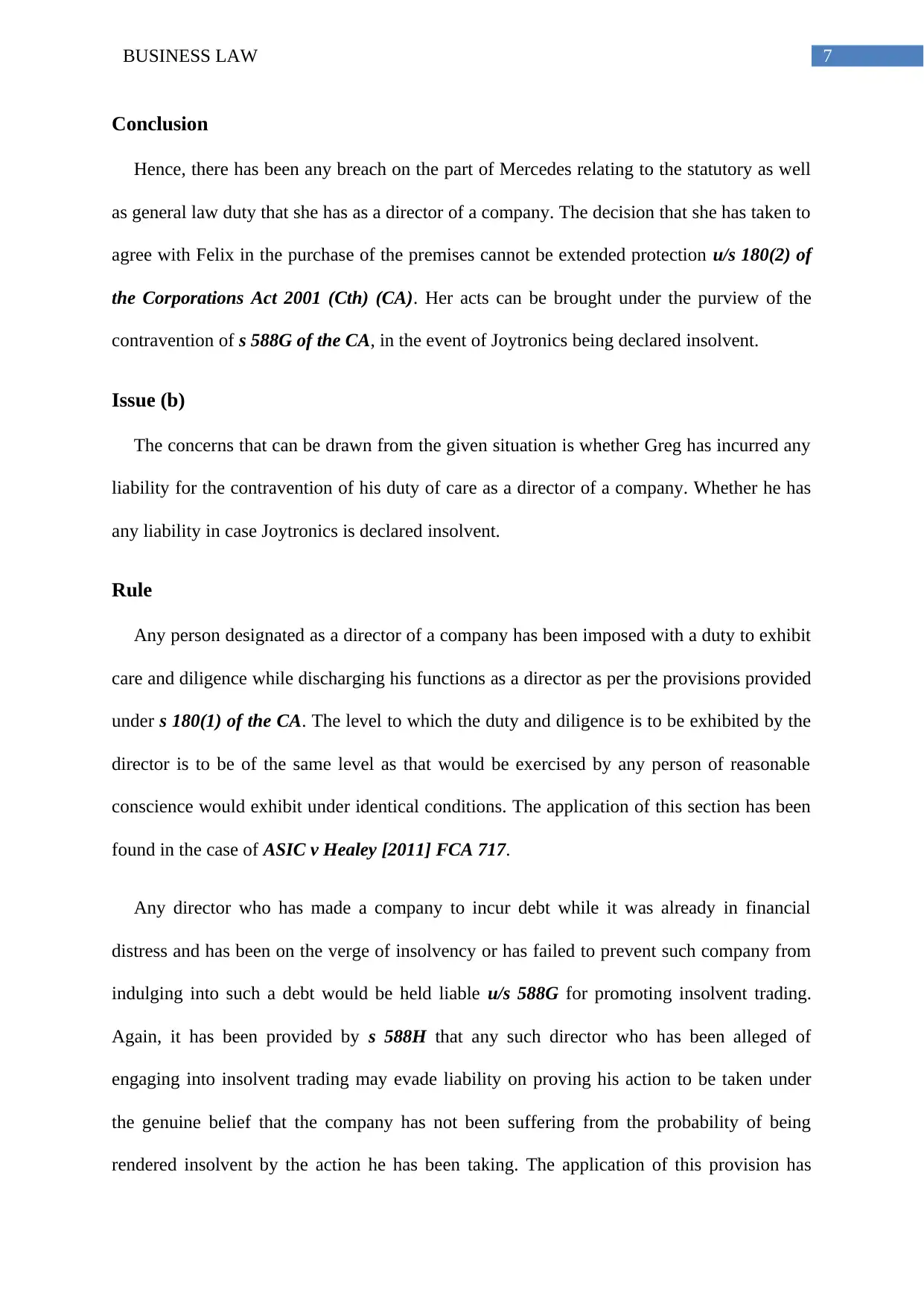
7BUSINESS LAW
Conclusion
Hence, there has been any breach on the part of Mercedes relating to the statutory as well
as general law duty that she has as a director of a company. The decision that she has taken to
agree with Felix in the purchase of the premises cannot be extended protection u/s 180(2) of
the Corporations Act 2001 (Cth) (CA). Her acts can be brought under the purview of the
contravention of s 588G of the CA, in the event of Joytronics being declared insolvent.
Issue (b)
The concerns that can be drawn from the given situation is whether Greg has incurred any
liability for the contravention of his duty of care as a director of a company. Whether he has
any liability in case Joytronics is declared insolvent.
Rule
Any person designated as a director of a company has been imposed with a duty to exhibit
care and diligence while discharging his functions as a director as per the provisions provided
under s 180(1) of the CA. The level to which the duty and diligence is to be exhibited by the
director is to be of the same level as that would be exercised by any person of reasonable
conscience would exhibit under identical conditions. The application of this section has been
found in the case of ASIC v Healey [2011] FCA 717.
Any director who has made a company to incur debt while it was already in financial
distress and has been on the verge of insolvency or has failed to prevent such company from
indulging into such a debt would be held liable u/s 588G for promoting insolvent trading.
Again, it has been provided by s 588H that any such director who has been alleged of
engaging into insolvent trading may evade liability on proving his action to be taken under
the genuine belief that the company has not been suffering from the probability of being
rendered insolvent by the action he has been taking. The application of this provision has
Conclusion
Hence, there has been any breach on the part of Mercedes relating to the statutory as well
as general law duty that she has as a director of a company. The decision that she has taken to
agree with Felix in the purchase of the premises cannot be extended protection u/s 180(2) of
the Corporations Act 2001 (Cth) (CA). Her acts can be brought under the purview of the
contravention of s 588G of the CA, in the event of Joytronics being declared insolvent.
Issue (b)
The concerns that can be drawn from the given situation is whether Greg has incurred any
liability for the contravention of his duty of care as a director of a company. Whether he has
any liability in case Joytronics is declared insolvent.
Rule
Any person designated as a director of a company has been imposed with a duty to exhibit
care and diligence while discharging his functions as a director as per the provisions provided
under s 180(1) of the CA. The level to which the duty and diligence is to be exhibited by the
director is to be of the same level as that would be exercised by any person of reasonable
conscience would exhibit under identical conditions. The application of this section has been
found in the case of ASIC v Healey [2011] FCA 717.
Any director who has made a company to incur debt while it was already in financial
distress and has been on the verge of insolvency or has failed to prevent such company from
indulging into such a debt would be held liable u/s 588G for promoting insolvent trading.
Again, it has been provided by s 588H that any such director who has been alleged of
engaging into insolvent trading may evade liability on proving his action to be taken under
the genuine belief that the company has not been suffering from the probability of being
rendered insolvent by the action he has been taking. The application of this provision has
Paraphrase This Document
Need a fresh take? Get an instant paraphrase of this document with our AI Paraphraser
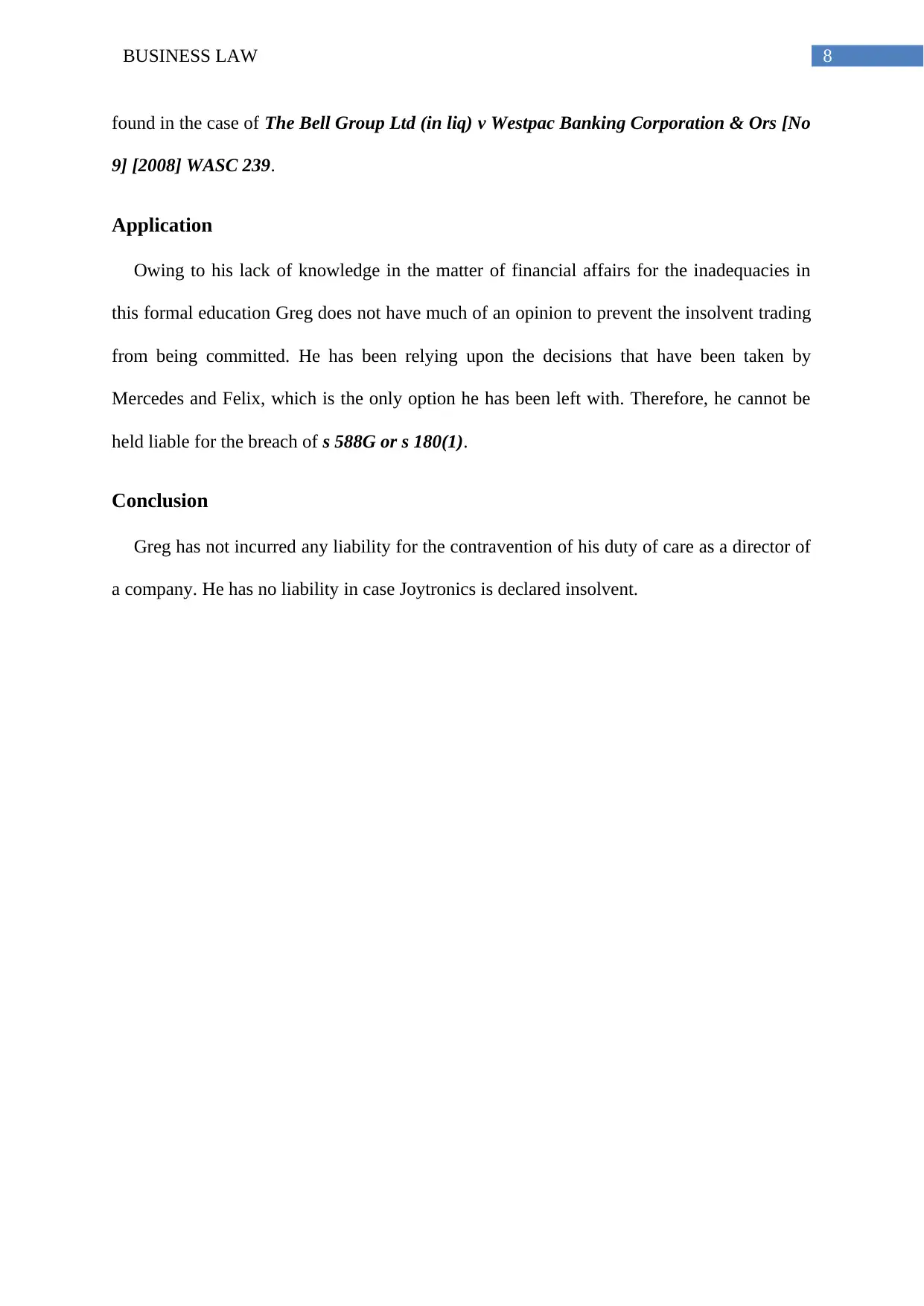
8BUSINESS LAW
found in the case of The Bell Group Ltd (in liq) v Westpac Banking Corporation & Ors [No
9] [2008] WASC 239.
Application
Owing to his lack of knowledge in the matter of financial affairs for the inadequacies in
this formal education Greg does not have much of an opinion to prevent the insolvent trading
from being committed. He has been relying upon the decisions that have been taken by
Mercedes and Felix, which is the only option he has been left with. Therefore, he cannot be
held liable for the breach of s 588G or s 180(1).
Conclusion
Greg has not incurred any liability for the contravention of his duty of care as a director of
a company. He has no liability in case Joytronics is declared insolvent.
found in the case of The Bell Group Ltd (in liq) v Westpac Banking Corporation & Ors [No
9] [2008] WASC 239.
Application
Owing to his lack of knowledge in the matter of financial affairs for the inadequacies in
this formal education Greg does not have much of an opinion to prevent the insolvent trading
from being committed. He has been relying upon the decisions that have been taken by
Mercedes and Felix, which is the only option he has been left with. Therefore, he cannot be
held liable for the breach of s 588G or s 180(1).
Conclusion
Greg has not incurred any liability for the contravention of his duty of care as a director of
a company. He has no liability in case Joytronics is declared insolvent.
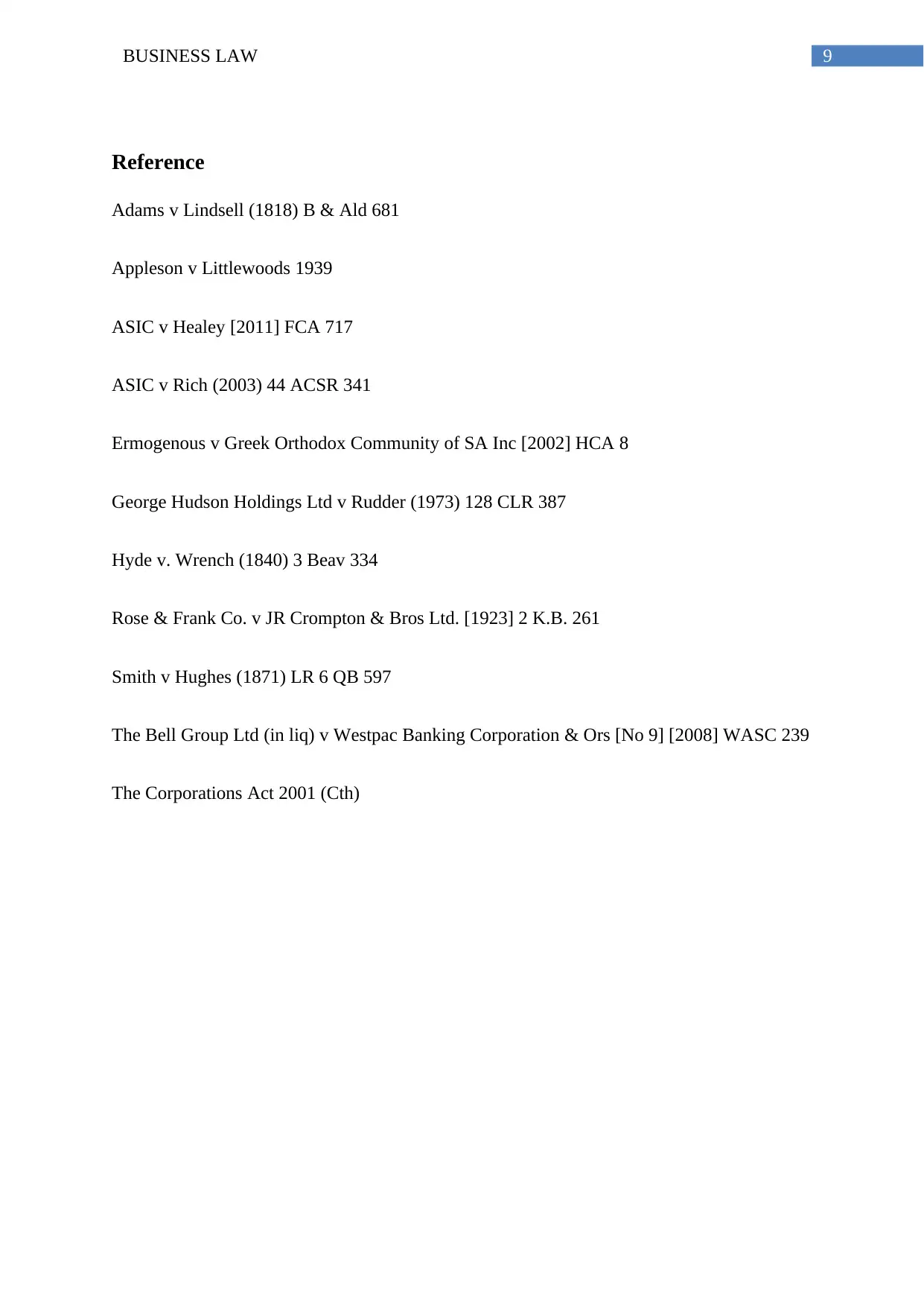
9BUSINESS LAW
Reference
Adams v Lindsell (1818) B & Ald 681
Appleson v Littlewoods 1939
ASIC v Healey [2011] FCA 717
ASIC v Rich (2003) 44 ACSR 341
Ermogenous v Greek Orthodox Community of SA Inc [2002] HCA 8
George Hudson Holdings Ltd v Rudder (1973) 128 CLR 387
Hyde v. Wrench (1840) 3 Beav 334
Rose & Frank Co. v JR Crompton & Bros Ltd. [1923] 2 K.B. 261
Smith v Hughes (1871) LR 6 QB 597
The Bell Group Ltd (in liq) v Westpac Banking Corporation & Ors [No 9] [2008] WASC 239
The Corporations Act 2001 (Cth)
Reference
Adams v Lindsell (1818) B & Ald 681
Appleson v Littlewoods 1939
ASIC v Healey [2011] FCA 717
ASIC v Rich (2003) 44 ACSR 341
Ermogenous v Greek Orthodox Community of SA Inc [2002] HCA 8
George Hudson Holdings Ltd v Rudder (1973) 128 CLR 387
Hyde v. Wrench (1840) 3 Beav 334
Rose & Frank Co. v JR Crompton & Bros Ltd. [1923] 2 K.B. 261
Smith v Hughes (1871) LR 6 QB 597
The Bell Group Ltd (in liq) v Westpac Banking Corporation & Ors [No 9] [2008] WASC 239
The Corporations Act 2001 (Cth)
⊘ This is a preview!⊘
Do you want full access?
Subscribe today to unlock all pages.

Trusted by 1+ million students worldwide
1 out of 9
Related Documents
Your All-in-One AI-Powered Toolkit for Academic Success.
+13062052269
info@desklib.com
Available 24*7 on WhatsApp / Email
![[object Object]](/_next/static/media/star-bottom.7253800d.svg)
Unlock your academic potential
Copyright © 2020–2026 A2Z Services. All Rights Reserved. Developed and managed by ZUCOL.





